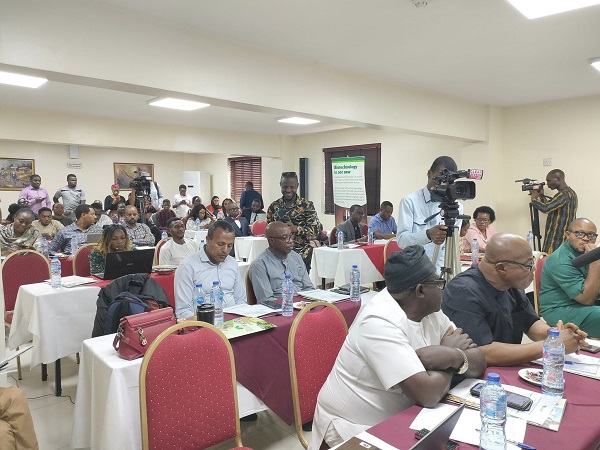
The chairman, National Variety Release Committee Ethiopia, Prof. Firew Mekbib has said the Pod-Borer Resistant (PBR) cowpea experience has shown that biotechnology can be Africanised.
He made this assertion during the biosafety and biotechnology stakeholders meeting held today (September 15, 2022) in Abuja as part of the study tour of a delegation from Mozambique and Ethiopia to Nigeria.
Mekbib, a professor of biotechnology, underscored Africa’s need to embrace the technology and contended that Africa cannot be a battleground for genetically modified organism (GMO) technology.
“We know what we should do. Africa can decide for itself which technology is essential for the transformation of its economy. We have been colonised by colonial masters but we can’t continue to be colonised in decision-making in science and technology.
“PBR cowpea has shown us that biotechnology can be Nigerianised, biotechnology can Africanised. This is the message. We developed from the existing indigenous cowpea variety. Of course, we didn’t have the facility. Some of the partners helped but we can do it on our own. PBR cowpea is the first in Africa and the first in the world. What does it show? Yes, we can decide on which technology Africa can adopt.
“We can’t continue to be sidelined. Nobody should dictate to us what technology is good for Africa. It is we who should decide basically. We need to decide for ourselves what is necessary for Africa by ourselves, for ourselves. So, the message is biotechnology has to be Africanised by African scientists, in an African environment.”
His counterpart, the director-general, Agronomical Research Institute of Mozambique, Dr. Olga Fatetine opined that the positive results achieved by Nigeria and the lessons learnt in all other countries will positively influence her country’s quest for the adoption of the product generated by biotechnology.
“We don’t have enough food for our people. The farmers work hard and harvest little. We continue to rely on food donations often, products that have been generated using biotechnology in the countries that give us the donations. But our countries still have fear of adopting these biotechnology crops,” she added.
Fatetine underscored the importance of credibility by following all the biosafety protocols/principles in the application of biotechnology, stating the country will surely build on Nigeria’s achievements to attain its quest of putting viable, virile seeds in the hands of farmers.
“We came here and the lesson learnt is that it is necessary to have a strong biosafety agency with autonomy in taking a decision. Also, we need local seed companies ready to take these varieties and multiply and supply the seeds. We, as scientists/breeders, need to speed up our process of breeding varieties to promote GMO varieties.
“We may take a little longer than we would love, one or two cropping seasons perhaps but we will get there to the right place where we want to go to put in the market a final product, high-yield, competitive, safe and environmentally friendly crops,” she added.
Earlier in his remarks, the director-general, National Biotechnology Development Agency (NABDA), Prof. Mustapha Abdullahi expressed pleasure that delegates across the continent have come to Nigeria to witness what is happening with crops that have been investigated and found reliable in solving issues across the continent.
“By coming to Nigeria, meeting with the scientists and stakeholders, I am sure this is going to go a long way in waxing the relationship that will happen across the continent.
“It is good that we come together and learn together to find a solution that is going to be accepted within the continent and promote our scientific findings rather than going outside to learn from people whose climes, soil and practices that are different from ours. So, I find this very encouraging,” he stated.
Similarly, the director-general of the National Biosafety Management Agency (NBMA), Dr. Rufus Ebegba emphasised that biotechnology and its application can transform the nation’s economy, especially in the agricultural sector in Africa, to be a major beneficiary.
He, however, noted that the regulation of the technology must not impact negatively on its development, particularly the application of modern biotechnology.
According to him, the essence of biosafety is to guide the developmental system of the technology to come up with products that are not harmful but products that are useful and economically beneficial to citizens to grow.
Speaking to journalists, the head of policy and regulatory affairs, African Agricultural Technology Foundation (AATF), Dr. Francis Nang’ayo said the purpose of the meeting is for stakeholders across the continent to cross-fertilise ideas to adapt and deliver agricultural technologies that can help smallholder farmers in Sub Saharan Africa.
“So, we have assembled partners from other countries to come and benchmark on the successes and breakthroughs that have been recorded here in Nigeria so that when they go back to their respective countries, some of the lessons picked from this trip can help to pave way for what they are doing to the next level,” he added.


